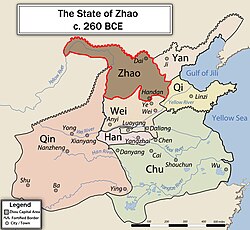State of Zhao
| State of Zhao | ||||||||||
| 趙 | ||||||||||
| Kingdom | ||||||||||
|
||||||||||
| Capital | Jinyang, Handan | |||||||||
| Religion |
Chinese folk religion ancestor worship |
|||||||||
| Government | Monarchy | |||||||||
| Historical era | Warring States period | |||||||||
| • | Partition of Jin | 403 BC | ||||||||
| • | Conquered by Qin | 222 BC | ||||||||
| Currency |
spade money other ancient Chinese coinage |
|||||||||
|
||||||||||
| Zhao | |||||||||||||||||||||||||||

"Zhao" in seal script (top), Traditional (middle), and Simplified (bottom) Chinese characters
|
|||||||||||||||||||||||||||
| Traditional Chinese | 趙 | ||||||||||||||||||||||||||
|---|---|---|---|---|---|---|---|---|---|---|---|---|---|---|---|---|---|---|---|---|---|---|---|---|---|---|---|
| Simplified Chinese | 赵 | ||||||||||||||||||||||||||
|
|||||||||||||||||||||||||||
| Transcriptions | |
|---|---|
| Standard Mandarin | |
| Hanyu Pinyin | Zhào |
| Gwoyeu Romatzyh | Jaw |
| Wade–Giles | Chao4 |
| IPA | [ʈʂâu] |
| Yue: Cantonese | |
| Yale Romanization | Jiuh |
| Jyutping | Ziu6 |
| Southern Min | |
| Tâi-lô | Tiō |
| Old Chinese | |
| Baxter-Sagart | *[d]rewʔ |
Zhao (Chinese: ) was one of the seven major states during the Warring States period of ancient China, created from the three-way Partition of Jin, together with Han and Wei, in the 5th century BC. Zhao gained significant strength from the military reforms initiated during King Wuling's reign, but suffered a crushing defeat at the hands of Qin at the Battle of Changping.
The territory of Zhao included areas in modern Inner Mongolia, Hebei, Shanxi and Shaanxi provinces. Zhao bordered the Xiongnu, the states of Qin, Wei and Yan. Its capital was Handan, in modern Hebei Province.
At the end of the Spring and Autumn Period, the state of Jin was divided up between three powerful ministers; the Zhao family patriarch being one of them. In 403 BC, the king of Zhou formally recognized the existence of the State of Zhao along with two other States, Han and Wei, marking the start of the Warring States Period.
At the onset of the Warring States period, Zhao was one of the weaker states. Despite its extensive territory, its northern border was frequently subject to harassment by the Xiongnu and by other northern nomadic peoples. At the same time, Zhao was surrounded by strong states and lacking the military strength of Wei or the prosperity of Qi. Zhao became an asset in the struggle between Wei and Qi, and this struggle came to a climax in 354 BC when Wei invaded Zhao, and Zhao had to seek aid from Qi. The resulting Battle of Guiling was a major victory for Qi, and it consequently lessened the threat to Zhao's southern border.
...
Wikipedia

